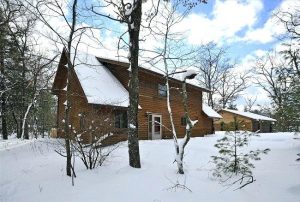
If you are a Snowbird, a Landlord, or you want to know how to safeguard your home during a winter vacation, read on. During extended (more than a few days) absences you want to ensure your home or rental property is protected from damage or loss, and also that your property insurance won’t be void during extended absences or vacancies. Before you leave any property vacant in winter you will want to talk to your insurance broker and find out what they require to ensure your property will be covered if something bad happens. Many insurers require someone to go into the property weekly to confirm all is well. If you have a monitoring system let your Insurance Broker know as it may help you with this.
Above all SHUT OFF THE WATER SUPPLY and DRAIN the water lines. To do this go to the main water line usually in the basement and shut it off. The open all taps and flush all toilets a couple of times. Then once the lowest tap has stopped trickling water shut the taps off starting upstairs and working your way down to the lowest one. I have 2 friends who have recently suffered losses at rental properties due to water leaks or freezing, and in both cases this step would have prevented the damage.
We have a complete home automation and security system in our Alberta home that alerts us to virtually any abnormality in the home (even our hot tub water temp is monitored). It also allows us to control the home while we are away, including security settings, smoke detectors, temperatures, lighting, cameras, doors and more.
Monitoring a home does not have to be complex or expensive. There are online systems like Vivent, or more sophisticated connected systems like Control 4 to name but two. Cameras that you can monitor online are inexpensive and easy to install. Wifi thermostats can be connected to your wifi network and allow you to monitor and set the temperature in your home using an App on your smartphone. We have one of these in our winter home in Arizona. It is a Honeywell thermostat we bought at Home Depot a couple of years ago for $100 CAD. Now they are around $129.
There is a new technology just coming of age called IFTTT (If This Then That) that allows users to control SmartThings of all types. If you’ve read about the Internet of Things you probably know about this. It might just make home automation easy and inexpensive for anyone. Here is an article describing how IFTTT is creatively powering the Internet of Things – http://www.dailydot.com/technology/ifttt-internet-of-things/
SmartThings is a technology that allows you to connect a huge variety of third party devices via its Hub and App. https://www.smartthings.com/how-it-works
Here is a pretty comprehensive review of home automation software and systems and devices http://safesoundfamily.com/blog/best-home-automation-software-products/
Travel safe!
